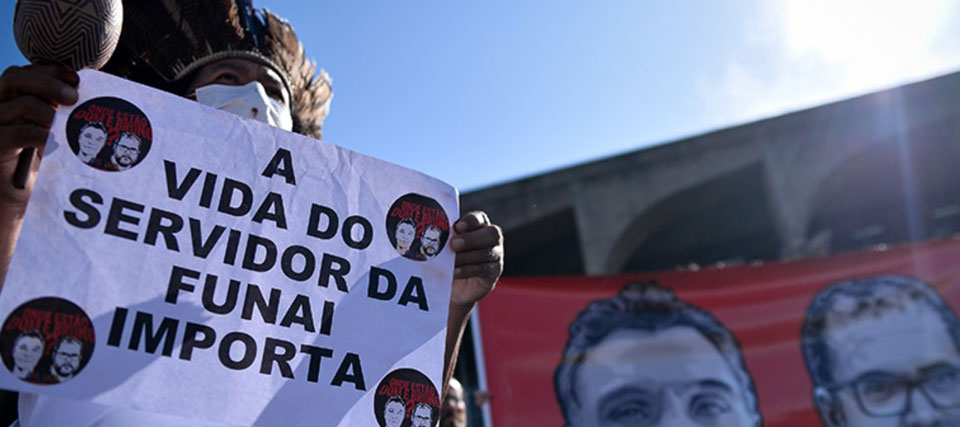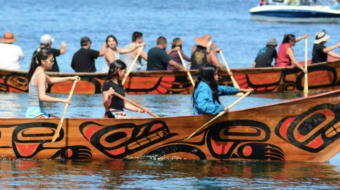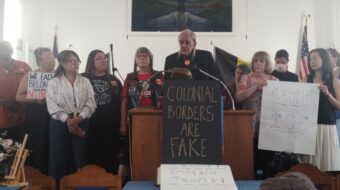
AMAZONIA — At the end of last year, a guy with a white father and an Indigenous mother entered the headquarters of FUNAI (Fundação Nacional do Índio), the National Indian Foundation, in Eirunepé, a city in the state of Amazônia, shouting, ignoring the waiting line and disrespecting any standard of manners. He invaded an employee’s office and began to offend him. With no security personnel at his disposal, the civil servant pushed the invader out of the building. The guy, who speaks Kulina Madija, the local Indigenous language, is known in the city for physically attacking Indigenous people who receive benefits from social programs like BPC (extended loan benefits) and Help Brazil, which has resulted in his being arrested more than once. As he was being expelled from the building, the invader threatened the FUNAI civil servant with violent comments that have become common throughout the Eirunepé municipality.
When they were in the street, the FUNAI collaborator responded to the invader’s provocations: “I’m not saying you’re a thief. I hear that from others. The whole city says it.” The man left and the FUNAI worker went on vacation. The next day, again, adversaries appeared at the FUNAI headquarters. At that hour, according to a protocol adopted during the pandemic, the door was locked to control the flow of people. Inside, there was only a female contract employee, responsible for administrative duties in the office. They pounded on the door repeatedly. She was frightened and did not open it. When she heard no more noise, she approached the entrance and found a sheet of white sulfite paper torn in half. On it was written: “Be careful FUNAI workers and stop percecuting [sic] us. Take care of your Indians.”
Days later, a man entered FUNAI headquarters pretending to be someone in need of a basic food basket—during the pandemic, FUNAI distributed food to villages unable to guarantee alimentary subsistence. The man spent some time inside and, on his way out, asked for a civil servant who had been threatened months earlier. He asked the man if he was the guy. He wasn’t.
Months passed, and the activities of FUNAI in Eirunepé went on as usual—not enough personnel, material, logistics, and, above all, security. The office manager went shopping at the city’s municipal market wearing his FUNAI uniform. Two men came up to him and said, “You better be careful.” They wanted the monitoring of invasions in the Indigenous territories of Cacau do Tarauacá, Mawetek, Kanamari do Rio Juruá and Kulina do Médio Juruá to cease. The office manager filed an official report about the occurrence and notified his hierarchical supervisor, Mislene Metchacuna Mantins Mendes.
Responsible as well for Atalaia do Norte (Amazônia), a little more than 250 kilometers away by airplane, or more than a thousand kilometers by river from Eirunepé, Ms. Mendes finds herself besieged with a multitude of problems regarding how to protect FUNAI personnel as they try to protect Indigenous lands in the Javari Valley. Substitute regional coordinator for almost a year, Ms. Mendes is still waiting to be recognized as the legitimate coordinator. The Bolsonaro regime has cut off dialogue between Brasília and far-flung FUNAI civil servants.
In Atalaia do Norte in particular, after the assassination of FUNAI civil servant Maxciel Pereira in 2019, colleagues who complained about the lack of on-the-job safety suffered vituperative hazing and administrative castigation. There is a permanent demand for the visible presence of public safety forces to impede the threats and attacks of fishermen and clandestine hunters, prospectors, extractors, and members of criminal factions with interests in the demarcated areas.
Until 2021, the Atalaia FUNAI functioned in a building on the riverbank which was condemned by the authorities as likely to collapse. Part of the street had already been swallowed up by the river and the seat of the agency was likely to be next. According to employee accounts, the windows were rotten, the place was infested with termites, rats, ants, and roaches, the ceiling threatened to fall at any moment, the bathrooms didn’t work, and no housekeepers were hired. In the parking lot, a drainpipe empties on a patch of riverbank where Indigenous people leave their canoes when they enter the city in search of help, identity cards, and the like. Many die in the city of rampant diseases.

Their headquarters was “a pigsty,” according to one FUNAI civil servant. But there were at least four private watchmen there who took turns guarding the structure in rotating 12-hour shifts. When new headquarters were finally leased, the security personnel remained in the old building, which today serves as a warehouse for supplies and remains the first stop for Indigenous people. But in the new headquarters, the only means of protection are remote-control cameras.
Mislene Mendes asked Brasília to contract private security for the FUNAI offices in both Eirunepé and Atalaia do Norte. The administration’s directors did not reply, so she decided to focus her efforts on the former city, to protect employees who had been threatened. In a resolution obtained on May 13, 2022, by the “You Should Know” data agency, in accordance with the Access to Information Law, the substitute coordinator Mendes asked her superiors to contract watchman services for what was supposed to be government property.

Not that Atalaia do Norte is problem-free, quite the contrary. Less than a month later, the Indigenist Bruno Pereira, on leave from FUNAI, and the British journalist Dom Phillips were brutally murdered in the Javari Valley, which is under Atalaia’s jurisdiction. Building security provides some protection to employees inside the building. But in the face of resistance by the public security forces to place permanent functionaries in the region, Mendes has done all she can.
Another spreadsheet obtained by the You Should Know data agency shows that, in the whole nation, the mobilization of the National Force retrogressed during Bolsonaro’s government. Made up of both military and civil police and firefighters, the National Force had a budget of roughly 31 million dollars in 2018, and that has been reduced annually until 2021 when it sank to $14 million. The Estado de São Paulo newspaper revealed that only six National Force agents are currently active in the Javari Valley Indigenous lands, an area comprising over 210 million acres, despite repeated requests for protection made by the Union of Indigenous Peoples of Javari Valley (Univaja).
In a dispatch last May, Mislene Mendes “took the opportunity to solicit a budget for the construction of a wall around the coordination site, as described by Dages in a phone call.” Dages is FUNAI’s administrative directory in Brasília which came up with the idea of building a wall. In Atalaia do Norte, according to piauí’s findings, the idea was considered ridiculous— “FUNAI keeps its doors open to Indigenous people during daily office hours. Why do they need a wall?”
Mislene Mendes emailed the document to Brasília on a Friday. The President of FUNAI, Marcelo Xavier, was in São Paulo, but by Monday he was back in Brasília. The official letter was not directed to him, but the Javari Valley is the second-largest Indigenous land in Brazil and contains the greatest concentration of isolated Indigenous peoples on the planet. It deserves the redoubled attention of competent authorities. Xavier, however, couldn’t be bothered to reply.
That same week, he entered an audience with the Attorney General as an “internal commitment” in his public agenda, and recorded only two “external activities.” He went to the AgroBrasília exhibit on Tuesday and, again, on Friday. The exhibit features displays of new AgroBiz products and technologies. Xavier gave an unaccustomed, lengthy interview to the event’s official information channel. In fact, it was an amicable conversation with an interlocutor who knew nothing at all about FUNAI, confusing it with matters having to do with the quilombolas [ancestral communities inhabited by descendants of the more than 4 million African people enslaved and brought to Brazil during three and a half centuries]. In this conversation, Xavier developed his proposal for doing away with the invasion of Indigenous lands: give illegally occupied Indigenous territories to the invaders and remove the aboriginal population to other areas.
“Enough of this Marxist-Trotskyite brand of anthropology that sees the invasion as a way to pressure the State into demarcating Indigenous areas,” he said. “That is wrong because you expel people who are in the titled areas for years, creating social conflict between Indigenes and non-Indigenes, and all this is fomented by some entities,” Xavier continued. “I have the solution—buy more land! It is completely possible to privatize and donate lands,” he suggested, and then went on to clarify: “We have a case like this in São Paulo. We invested $300,000 to buy an area of 865 acres in which we placed 60 families.”
A Federal Police chief and specialist in mixed crop and animal farming, Xavier is cozy with Nabhan Garcia, Bolsonaro’s secretary of agrarian matters, described by environmentalists as an ally of property-deed forgers. Bruno Pereira and Dom Phillips disappeared on Sunday, June 5th, and days later Xavier declared that they had entered the Indigenous lands of Javari Valley illegally, without authorization. In fact, the two men disappeared outside the boundaries of the Indigenous area and informed Mislene Mendes before embarking on their journey. FUNAI workers demanded Xavier retract his false statement, and now say they will strike to demand Xavier’s dismissal. In the meantime, FUNAI is being progressively dismantled, losing personnel, and lacks structure without a chief dedicated to upholding its constitutional missions.
After Bruno Pereira and Dom Phillips were murdered there, the president of FUNAI did not communicate with FUNAI civil servants in the Javari Valley. “The organization’s directors were not in evidence, they simply disappeared,” says a FUNAI worker from Atalaia do Norte who, like others interviewed by this reporter, asked to remain anonymous for fear of reprisals by FUNAI management and by criminals active in the region where they work. Only now, at the end of June, was the hiring of patrimonial security personnel authorized for the FUNAI offices in Eirunepé and Atalaia do Norte.
The Indigenists know full well that this is an extremely limited, palliative solution. They say that the only thing preventing local criminals from invading the FUNAI building and “killing everyone with automatic weapons” is their reluctance to attract attention antithetical to their business interests. The familiarity of the Indigenists and the criminal elements extends from the municipal marketplace to streets full of houses. In Atalaia do Norte, for instance, an ex-FUNAI coordinator went to the police station to register a report of the incident after the arrest of the illegal fishermen. When she lodged the complaint, she sat on the same bench as the man suspected [of killing Pereira and Phillips]. Days later, she went to the bakery and came face to face with him again.
Questioned by this reporter about the hiring of private security and extraordinary measures taken to protect employees in Amazônia, FUNAI did not reply.
A few days after the murder of Pereira and Phillips, which had international repercussions, the Federal Police claimed that there were no indications that criminal bosses or organizations were involved in their murders. “The investigations point to the fact that the perpetrators acted alone,” according to this body. Nobody allied with FUNAI in the Javari Valley believes a word of this. The ties between the illegal fishermen and drug sellers in the region that shares a border with Peru are increasingly obvious. Cases of threats and intimidation are not isolated. They occur frequently and systematically in diverse locations and, each time, they are more provocative. The Bolsonaro government has empowered them, an anonymous FUNAI civil servant claimed, lamenting the anesthesia that appears again to pervade Atalaia.
The majority of journalists have departed. The Federal Police and the Army have withdrawn their troops. Just one Navy vessel is moored in the river, and the police are nowhere to be seen. City life has become routine again. The Indigenists have resumed their functions and they are overwhelmed with new cases. However, they continue to leave the door open. But there is a lot of lethargy in the heavy air of Amazônia. Everyone knows that it is only a matter of time until the next episode.
Translated for People’s World by Peter Lownds. The original article in Portuguese can be viewed here.










